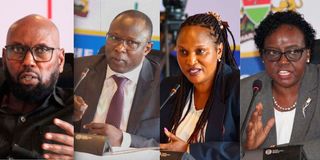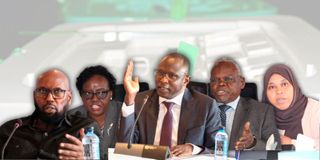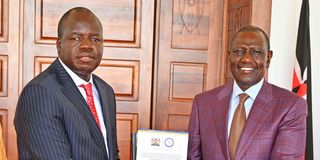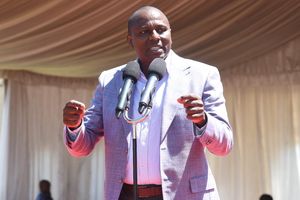
IEBC nominees Hassan Noor Hassan, Erastus Edung Ethekon (chairperson), Anne Nderitu and Mary Karen Sorobit.
Kenyans’ desire for reconstitution of the electoral commission may be delayed further for indefinite period following queries on eligibility of four of the seven persons nominated by President William Ruto recently.
A petition filed at the High Court in Milimani Nairobi claims that the proposed chairperson, Mr Erastus Edung Ethekon, together with nominees Hassan Noor Hassan, Mary Karen Sorobit and Anne Nderitu were not qualified to apply or to be selected as members of the Independent Electoral and Boundaries Commission (IEBC).
This is because of perceived bias, breach of the principles of political neutrality, vying for political posts in2022, being member of political outfits and failure to leave State offices before their nomination.
They were nominated alongside Moses Mukwana, Francis Odhiambo and Fahima Abdalla as commissioners. The court case, which poses a fresh stalemate on the reconstitution of the polls body, came at a time the National Assembly is preparing to vet the seven nominees.
Although the petition is against all the seven nominees over President Ruto’s failure to consult the opposition political party, the petitioners have raised eligibility and integrity queries against the four. They want the President’s recommendation cancelled.
Should Parliament approve the seven nominees and the petition against the four sail through, IEBC will remain inoperative due to lack of quorum to conduct business.

Erastus Edung Ethekon (center) and other nominees for IEBC commissioners (from left) Hassan Noor Hassan, Mary Karen Sorobit, Francis Odhiambo Aduol and Fahima Araphat Abdallah.
The IEBC (Amendment) Act says the “the quorum for the conduct of business at a meeting of the Commission shall be at least five members of the Commission”.
Court papers show that the additional names submitted to the President by the Selection Panel include Edward Katama Ngeywa, a 49-year-old from Transzoia County living with disability who the panel proposed for the chairperson position alongside Mr Ethekon. For commissioner posts, the Panel had also proposed Mr Phillip Kakai and Joseph Kyavoa.
The President did not disclose why he declined the Panel’s proposal on the three, which is one of the grounds in the ongoing court case.
The petition was filed by two Kenyans, Mr Kelvin Roy Omondi and Boniface Mwangi, who want court to bar the seven nominees from being vetted or assuming office.
Alleged exclusion
Their lawyers, Douglas & Associates Advocates, claim that the consultation with opposition was a requirement under the National Dialogue Committee (Nadco) Report and the IEBC (Amendment) Act, 2024. In addition, they allege exclusion of other regions like of the entire Upper and Lower Eastern regions (Ukambani) in the commission.
“The nominations contravene the Constitution in that they are not representative of Kenya’s diverse communities, exclude other ethnic communities and persons with disabilities. The nominees were selected without any prior consultation with the opposition political party as required under the National Dialogue Committee Report and IEBC (Amendment) Act, 2024,” says the petitioners.
It is their case that Mr Ethekon nomination as chairperson of IEBC is unconstitutional and illegal as his recommendation is laced with perception of likelihood of being biased on account of his inclinations and affiliations with Mr Josephat Nanok, the Statehouse Deputy Chief of Staff.
Court papers shows that Mr Ethekon served as Turkana County Attorney when Mr Nanok was the governor, “hence the nomination is tainted with the impartiality and neutrality required of a Chairperson of IEBC”.
For Mr Hassan Noor Hassan, it is alleged that he was ineligible to apply or be selected as an IEBC commissioner as he vied for Mandera county governorship in 2022.
The petitioners believe that this automatically disqualified him from applying for the IEBC commissioner post even before being shortlisted for interviews and the subsequent nomination.
Article 88(2) of the Constitution provides that “A person is not eligible for appointment as a member of the Commission if the person has, at any time within the preceding five years, held office, or stood for election as a member of Parliament or of a County Assembly; or member of the governing body of a political party”.

President William Ruto receives the report on the recruitment of nominees for the positions of chairperson and members of the IEBC from Selection Panel Chairman, Dr Nelson Makanda at State House, Nairobi.
His nomination is also contested on grounds that he was not shortlisted for the interviews earlier and was sneaked in through an addendum contrary to the selection and nomination process under the IEBC Act.
For Ms Sorobit, they contend that she too was ineligible as she was the Executive Director and member of the governing body of the Jubilee political Party in the last five years preceding her selection and nomination.
“The nomination of Ms Sorobit is unconstitutional and unlawful as she was, at the time of her nomination, a member and office bearer of a political party, specifically having served as a County Chairperson of the Jubilee Party within the preceding five years of elections which were held in August 2022. This contravenes the express provisions of Article 88(2)(a) of the Constitution,” says the petitioners.
They want court to declare that she is conflicted and incapable of discharging her duties with the impartiality, independence, and integrity required of a commissioner under the Constitution.
In relation to Ms Nderitu, the petitioners contend that she is a State Officer serving as Registrar of Political Parties and hence she was ineligible to apply for or be selected as a nominee to serve in EIBC.
The petitioners further contend that the Selection Panel’s report and outcome of the interviews constituted important information to be shared with the public.
They argue that it was unconstitutional for the President and the Selection Panel to fail to publicize the information relating to the performance of the candidates and the report on the interviews. They requested for the information pertaining to the interviews but their request was ignored, they say.
“The selection is not based on merit as some of the candidates did not achieve high scores in the interviews, and some have integrity issues while other candidates were irregularly added to the shortlist thus compromising the process and inviting the court’s sanction,” reads the petition.
The petition is pending determination before Justice Lawrence Mugambi is scheduled for oral hearing on Friday on the petitioner’s application for interim orders suspending the vetting.
By the time of publishing this article the nominees, together with the Attorney General, Head of Public Service and National Assembly, who are listed as respondents and interested parties , had not filed their responses.
The case against the nominees
1. Erastus Edung Ethekon (chairperson)
Accusation: Bias. He has affiliations with Josephat Nanok, the State House Deputy Chief of Staff of President Ruto, having served as Turkana County Attorney when Mr Nanok was the governor.
2. Hassan Noor Hassan
Accusation:
Ineligible to be IEBC commissioner selected as he contested for Mandera County governorship in 2022.
Sneaked in through an addendum contrary to the selection and nomination process under the Independent Electoral and Boundaries Commission Act.
3. Mary Karen Sorobit
Accusation: Ineligible to be IEBC commissioner as she was the Executive Director and member of Jubilee Party governing council in the last five years preceding her selection and nomination.
4. Anne Nderitu
Accusation: She is a State Officer and hence ineligible to be selected as IEBC commissioner.









